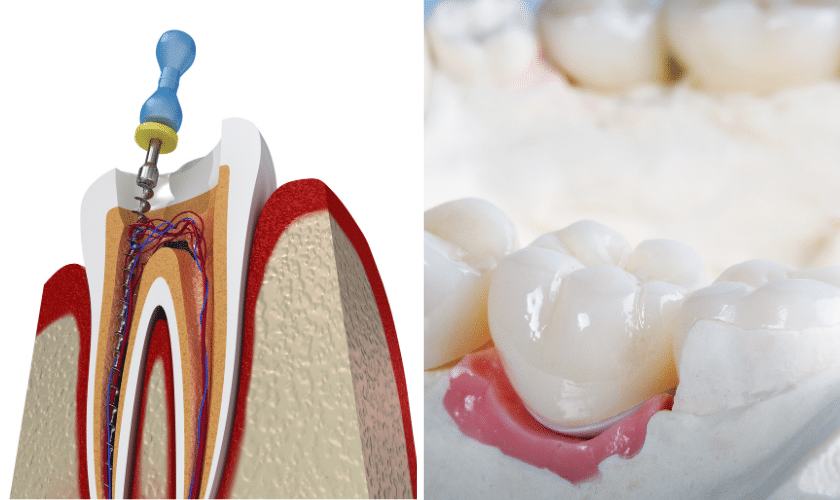Can You Get A Root Canal And Crown On The Same Day?

Are you in need of a root canal and crown treatment? Perhaps you’re wondering if it’s possible to get both procedures done in just one day. Well, we have exciting news for you! In this blog post, we’ll delve into the world of dentistry and uncover whether it is indeed feasible to receive a root canal and crown on the same day. So grab your dental floss and let’s dive right in!
Understanding Root Canals and Crowns
When it comes to dental procedures, two common treatments that often go hand in hand are root canals and crowns. But what exactly are these procedures, and how do they work together?
A root canal is a procedure performed to save a tooth that has become infected or severely decayed. During the treatment, the dentist removes the infected pulp from the inside of the tooth, cleans and disinfects the area, and then fills it with a special material. This process helps to alleviate pain and prevent further infection.
On the other hand, a crown is a cap-like restoration placed over a damaged tooth to restore its shape, strength, and appearance. It provides protection for weakened teeth while also enhancing their aesthetic appeal.
While these procedures may seem separate at first glance, they often go hand in hand. In many cases where a tooth requires a root canal treatment due to infection or decay reaching deep into the pulp chamber, it will also need additional support provided by placing a crown.
The reason for this is simple – after undergoing root canal therapy, the affected tooth becomes more brittle and prone to fractures or further damage. Placing a crown on top of it following root canal treatment ensures the long-term durability of both your natural tooth structure as well as any restorations put in place during this process.
Can You Get A Root Canal And Crown In The Same Day?
This is a common question that many dental patients have. Let’s explore this topic and shed light on whether or not it is possible to receive both treatments in a single visit.
First, let’s understand what root canals and crowns are. A root canal is a procedure that removes infected pulp from the tooth’s root, relieving pain and preventing further damage. On the other hand, a crown is a cap-like restoration placed over a damaged tooth to restore its shape, size, strength, and appearance.
Now, onto the main question: Can these two procedures be done in one day? The answer depends on various factors such as the extent of dental work needed, scheduling availability at your dentist’s office, and individual patient needs.
In some cases where there is minimal infection or damage to the tooth structure, it may be possible for your dentist to perform both procedures on the same day. However, this would typically require an efficient and well-coordinated appointment schedule between your endodontist (who performs the root canal) and your restorative dentist (who places the crown).
Expedited treatment plays a crucial role in getting both procedures done simultaneously. It requires coordination between specialists who can work together seamlessly to provide expedited care without compromising quality.
While it may be possible to get a root canal and crown in one day for certain cases with less complex issues or through coordinated efforts of dental professionals working together efficiently; generally speaking – multiple appointments are usually required for these separate but interrelated treatments.
If you’re considering getting both procedures done simultaneously or have any concerns about your oral health condition requiring these treatments; reach out to your dentist or endodontist for personalized advice tailored specifically to your needs. They will evaluate your case thoroughly before recommending an appropriate treatment plan suited best for you!
The Role of Expedited Treatment
When it comes to dental procedures like root canals and crowns, timing is everything. That’s where expedited treatment plays a crucial role.
Expedited treatment refers to the process of getting a root canal and crown in the same day or within a short period. This streamlined approach saves patients from having to make multiple appointments and endure additional discomfort.
One of the main benefits of expedited treatment is efficiency. By combining these two procedures into one visit, dentists can save both their time and the patient’s time. This not only makes scheduling easier but also reduces overall treatment duration.
Additionally, expedited treatment can provide immediate relief for patients experiencing severe pain or discomfort due to an infected tooth or damaged crown. Instead of waiting days or weeks for relief, they can have their issue addressed immediately.
Furthermore, by getting a root canal and crown on the same day, patients avoid potential complications that may arise if there is a delay between treatments. It ensures that any infection present in the tooth is effectively treated before placing the permanent crown.
However, it’s important to note that not all cases are suitable for expedited treatment. The decision ultimately depends on factors such as the severity of the infection or damage, as well as individual patient needs.
Expedited treatment offers numerous advantages when it comes to getting a root canal and crown in one visit. It saves time, provides immediate relief from pain or discomfort, and minimizes potential complications associated with delayed treatments. If you’re considering this option for your dental needs, consult your dentist to determine if it’s right.
Getting a root canal and crown on the same day is not always possible or recommended. While there are some instances where expedited treatment may be an option, it ultimately depends on the complexity of the case and the dentist’s judgment.
It’s important to understand that both procedures serve different purposes. A root canal is done to treat an infected or damaged tooth pulp, while a crown is used to restore strength and protect the tooth after a root canal or other dental procedure.
The decision to combine these treatments will depend on various factors such as your oral health, the condition of your tooth, and your dentist’s expertise. They will assess whether it is safe and appropriate for you to undergo both procedures simultaneously.
Remember that each patient’s situation is unique, so it’s essential to consult with your dentist for personalized advice. They can evaluate your specific needs and determine the best course of action for restoring your oral health effectively.
If you have any questions or concerns about getting a root canal and crown in one visit, don’t hesitate to reach out to your dental professional. They’ll provide you with all the necessary information and guide you toward making informed decisions about your dental care journey.
FAQs
1. Can I get a root canal and crown on the same day?
While it is possible to get a root canal and crown on the same day, it is not always the norm. In most cases, these two procedures are done separately to ensure that each step is completed with precision and accuracy.
2. Why do I need a root canal before getting a crown?
A root canal treatment becomes necessary when the pulp inside your tooth becomes infected or damaged. This procedure involves removing the infected tissue from the tooth’s roots and sealing them off to prevent further infection. Once this is done, a dental crown may be placed over the treated tooth to restore its strength, function, and appearance.
3. How long does it take to complete a root canal treatment?
The length of time required for a root canal can vary depending on factors such as the complexity of your case and whether any additional treatments are needed afterward. On average, however, most root canals can be completed within one or two appointments.
4. How long does it take to place a dental crown?
The process of placing a dental crown typically requires two separate visits to your dentist’s office. During the first visit, your dentist will prepare your tooth by removing any decay or damage and shaping it for proper placement of the crown. They will then take impressions of your teeth which will be used by an off-site lab technician in creating your custom-made permanent crown. In between visits, you may receive a temporary crown for protection until your next appointment where they will cement the permanent one into place.
5. Can I experience pain during these procedures?
Root canals are often associated with discomfort due to misconceptions surrounding them; however, the procedure itself should not cause significant pain as local anesthesia ensures you’re comfortable throughout.
Recent Posts

Tips to Manage TMD at Home from Havertown Dental Arts

Gum Disease Warning Signs: When Havertown Patients Should Call Dr. Maconi

5 Ways to Take Full Advantage of Your Dental Benefits Before They Expire

Fueling Healthy Smiles: Local Food Choices in Havertown and Their Impact on Your Teeth


